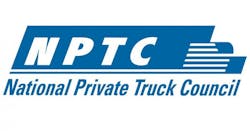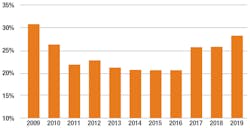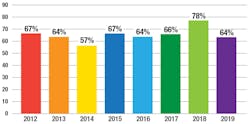This is part four of a four-part series on reducing empty miles. Read part one, two and three here.
Private fleet managers are continuing to focus on improving productivity by reducing the number of non-productive empty miles, the National Private Truck Council reported in its 2019 Benchmarking Survey. For the total fleet population, the number of empty miles that were available for backhaul for all fleets in the survey increased to 28%, up from the 26% reported in last year’s survey. By comparison, in 2009, the empty backhaul percentage crested at 30%, which NPTC said puts the near ubiquitous drive to improve productivity into great perspective.
NPTC’s survey found that of those miles, half would be available for sale, compared to the 42% reported last year. That means some of those miles are already being used for dunnage, pallet exchange, returns, crates, bins, totes, and the like, NPTC said. This year’s survey reported that the typical revenue per mile that fleets were realizing from participating in backhaul movements was $1.86, which was virtually unchanged from last year’s $1.87 revenue per mile.
To fill empty miles, private fleets acquire for-hire authority so they can pursue revenue-producing freight. The number of fleets with for-hire authority reached 64% in the 2019 NPTC study, down from the 78% reported last year, but in line with the historical averages that run in the 64% to 67% range, NPTC said.
In the overwhelming majority of the cases, 95%, internal company freight takes precedence over the outside freight, NPTC reported. Among survey respondents, 5% said they give equal priority to company freight and contracted freight. “These results, which are in line with previous years’ levels, provide evidence that private fleets use for-hire authority as a supplemental strategy to fill empty backhauls—without compromising the quality of service provided to their parent company and internal customer,” the report stated.


